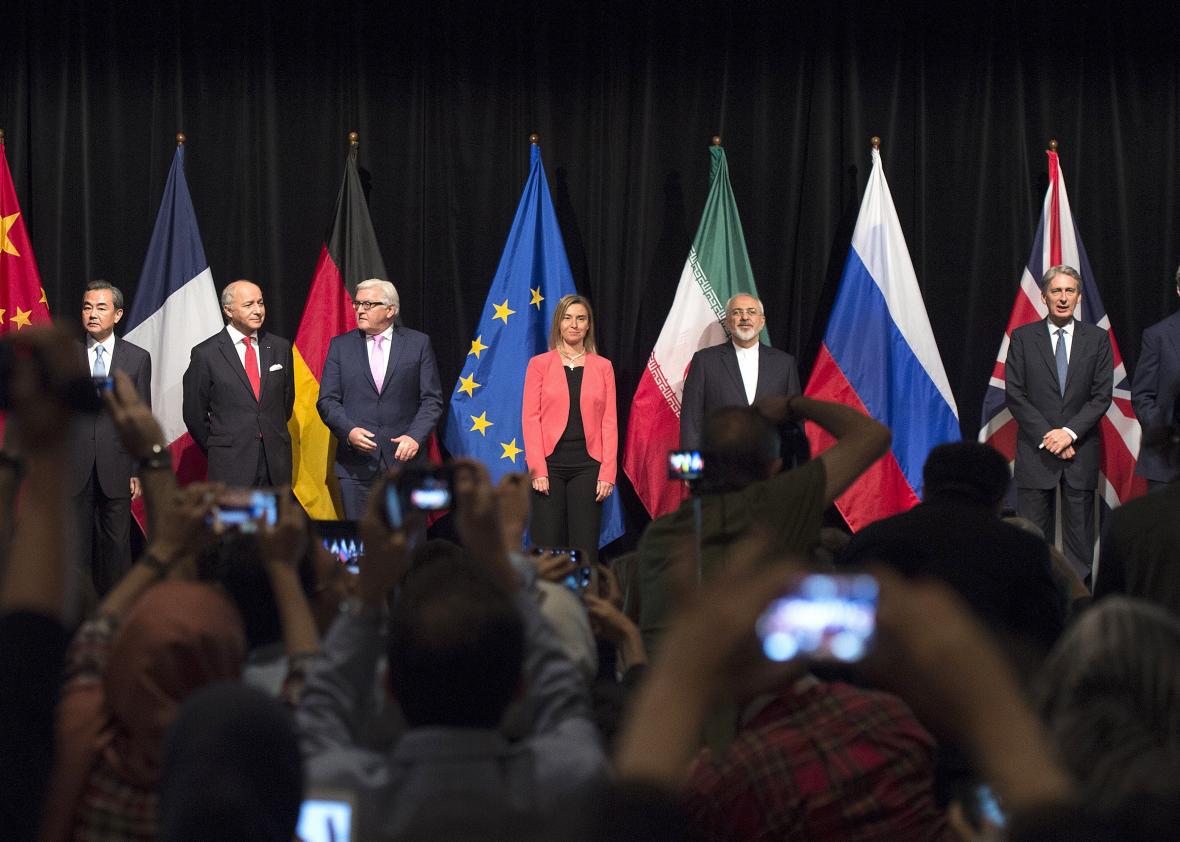Two years ago today, after almost two years of agonizing negotiations, Iran signed an agreement in Vienna with six countries, led by the United States, to limit its nuclear program in exchange for international sanctions relief. The Iran deal, officially known as the Joint Comprehensive Plan of Action, was one of the signature foreign-policy achievements of the Obama administration, accomplished despite the staunch opposition of congressional Republicans, who went so far as to send a letter to Iran’s supreme leader saying the deal would be scrapped as soon as they retook the White House. The current president promised during his campaign that his “number-one priority is to dismantle the disastrous deal with Iran,” or at least renegotiate it.
And yet, considering the wrecking ball that the Trump administration has already taken to Obama’s foreign-policy legacy, and the degree to which the White House has adopted hostility to Iran as a guiding principle, the deal looks more robust on its second birthday than you might think. By law, the State Department is required to notify Congress every 90 days on whether Iran is still in compliance with the agreement, and the next deadline is Monday. The administration is reportedly likely to once again grudgingly recertify Iran’s compliance, meaning the nuclear-related sanctions relief will continue. (The U.S. maintains a variety of other sanctions on Iran, related to support for terrorism, ballistic missile development, and human rights, that were not affected by the nuclear pact.)
Despite the White House’s obvious skepticism about the deal, it would be hard to do otherwise. Both international monitors and U.S. intelligence agencies believe that Iran is, in fact, in compliance with the agreement. Still, congressional Republicans are running out of patience. A group of four leading Senate Iran hawks wrote a letter to Secretary of State Rex Tillerson ahead of the certification deadline, urging him to make a change in policy, arguing that “U.S. interests would be best served by a sober accounting of Iran’s JCPOA violations as well as the regime’s aggressive and destabilizing behavior.”
But ironically, the very measures that Congress put in place in an attempt to constrain Obama’s outreach to Tehran have made the deal harder to undo. The Iran deal isn’t a formal treaty, which would have required an inconceivable two-thirds majority of the Senate to approve, but it’s not simply an executive order either. In 2015, pushing to give itself a voice in the negotiations, Congress passed legislation prohibiting Obama from lifting sanctions until after a 30-day review period, during which time it would pass a new resolution, blocking the deal. (As it turned out, opponents didn’t have the votes to do that.) It was that law that set the requirement for the State Department to certify Iran’s compliance every 90 days. This has put the Trump administration in the frustrating position of having to affirm every three months that Iran is still complying with the deal. Unlike other signature Obama achievements like the Paris climate change agreement and the diplomatic opening to Cuba, which were carried out by executive action without congressional involvement and were easy to undo, the Iran deal is in some sense U.S. law.
It’s also worth keeping in mind that if the U.S. did re-impose its nuclear sanctions on Iran, the other countries involved in the agreement would be unlikely to follow suit, meaning that the U.S. would be diplomatically isolated and the pressure on Iran would be a lot weaker than it was before 2015.
That’s not to say that the deal will definitely outlive the Trump administration. For now, the State Department’s official line is that it’s not making any major shifts until the completion of an ongoing overall review of U.S.-Iran policy, so changes could be coming.
As the Paris and Cuba reversals show, the Trump administration is not necessarily averse to self-defeating actions that leave the U.S. diplomatically isolated. And as Trump’s response to Russia’s hacking of the 2016 election shows, he’s also not averse to simply ignoring the assessments of his own intelligence agencies when it suits him.
